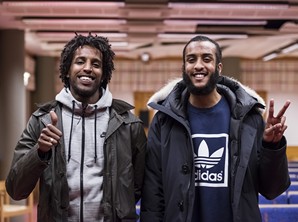Change - a Chance for Tensta

With many European cities experiencing increased demonstrations and uprisings by young people, the situation has shown that peace is not only needed in countries torn apart by war. Rather, peaceful coexistence is needed everywhere. All societies need to make sure that people do not feel left out. This is particularly true for their young people, as feelings of alienation and exclusion from society can easily lead them into violence and criminality.
Tensta – a suburb of Stockholm
In the Stockholm suburb of Tensta, similar social unrest and protests were staged in 2012 and 2013. Perceived by many as one of the most dangerous areas in Sweden, and often portrayed negatively in the media, it is home to a large immigrant population, which proudly boasts the multicultural and welcoming nature of the neighbourhood.
Confident that its inclusive and participatory approach could help address some of the tensions facing Stockholm’s suburbs, Interpeace launched a pilot project in Tensta in 2014 (read up on recent developments). Interpeace’s pilot project in Tensta involved the consultation of a broad range of stakeholders, including teachers, police, religious leaders, families and civil society. Through these, the project took stock of the opportunities and challenges facing the population of Tensta. It also revealed that the Tensta youth could play a central role for positive change, and thus also gave them the opportunity to tell their stories by means of the innovative method of participatory video.
The findings of this project have been captured in a report entitled ‘Voices from Tensta’ as well as in a video documentary called ‘Dreams from Tensta’. Both of these will be presented at an upcoming event on 10 June, Change for Tensta – a Chance for Tensta.
 |
Change for Tensta
The presentations will be followed by a discussion with three distinguished speakers, each familiar with the situation and difficulties that Tensta residents face on a daily basis: Carin Götblad, Chief of Uppsala Police and board member of Interpeace Sweden; Eva-Britt Leander, Strategic Developer for preventive work concerning children, youth and families in the Spånga-Tensta City District; and Tomas Amanuel, Interpeace’s facilitator in Tensta. Based on their respective experience, each panelist will explore what sustainable and positive change means for the Tensta community.
This event is important for the community, as it explores different ways of building on existing strengths and how to contribute to societal change Having identified the strength and potential that Tensta’s residents offer, Change – a Chance for Tensta provides with an ideal opportunity to reflect on how everyone can contribute to bring about change.
